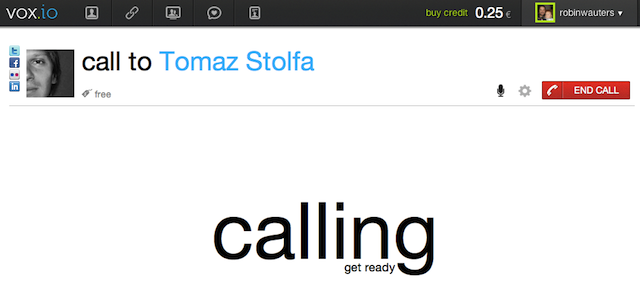A European company by the name of Skype taught the world that enabling people to make free voice and video calls over the Internet would be an enticing offer to hundreds of millions of users, and make for a great business at the same time. Now, a Euro startup called Vox.io plans to challenge them by envisioning how digital telephony should work in 2012 and beyond.
They provide a simple tool that lets people make free calls to other vox.io users from their desktop browser, or their iPhone (app link). But vox.io is not your traditional VoIP service, and on the Web requires no downloads or installations of any kind.
The startup, which hails from Slovenia, stands out because it has built its service to fit nicely into the current Web ecosystem, moving away from plugins, desktop apps and the like, with modern real-time and mobile communication trends squarely in the back of founder Tomaž Štolfa’s mind. Notably, the software is also designed from the ground up to play nicely with other Web services, and even allow in-stream access to third-party content (think Flickr photos or YouTube videso) in the future, too.
This differs from the path chosen by the likes of Skype, Viber, fring, JAJAH and Rebtel, mind you.
The company also focuses on simplicity and great design, and doesn’t shy away from experimenting when it comes to the business model, which is always a tricky thing for a telephony startup.
When you sign up for its service, you’ll get a profile URL like vox.io/name, which will serve as the central point of contact with the ability to replace your one or more telephone number(s).
You can use the online tool to place voice and video calls to other users, or call regular local and international regular lines for a fee. I tested it, and the call quality was outstanding. Vox.io also supports group calls of up to 5 people, and lets you easily import and sync your existing contacts.

The company plans to generate revenue from calls to traditional telephony and the delivery of SMS messages. Calls from one vox.io user to another will always remain free, but the company says it is exploring different ways to move away from charging users for minutes – one of its ideas is charging for ‘disposable call links’ that could last for, say, 14 days rather than a single conversation.
Basically, such disposable links could be shared with people you’re not necessarily close with but need to speak to all the same, and they would stop working after the call. No more deciding between giving out your phone number or not, in other words. On top of that, a vox.io/name profile also fits nicely on business cards, email signatures and on social network bios, and can rapidly be shared over SMS, IM, calendar events and whatnot. It’s like Skype for the Web generation!
I realize I’m raving, but I’m excited about this startup for a good reason – you’ll see what I mean when you use vox.io yourself. There are obvious things missing (support for other mobile platforms, instant messaging, more payment options to purchase call credits and more) but it’s already a stunning product for such a young Slovenian company operating on fairly limited resources.
Vox.io is backed by angel investors and renowned European startup accelerator Seedcamp; the startup won the Mini Seedcamp London event in January 2011 and was justifiably selected as one of the top startups at Seedcamp Week 2011. If what I’ve been hearing through the grapevine is accurate, the company will soon be announcing a significant additional financing round, though.
Give the vox.io beta service a solid whirl and let us know what you think.
